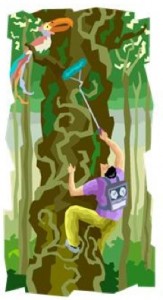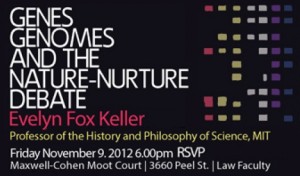Have you ever wondered about the route that Santa takes on Christmas Eve? Here’s a 2-minute video that hypothesizes what Santa’s route would be if he used population statistics to plan his journey:
Posts By:
Extreme scientific analysis
Discoblog is one o f my favorite blogs. It reports on weird, humorous, and astonishing studies that have been published. Here are links to some posts about studies that the Disco-bloggers labeled, “analysis taken too far”:
f my favorite blogs. It reports on weird, humorous, and astonishing studies that have been published. Here are links to some posts about studies that the Disco-bloggers labeled, “analysis taken too far”:
- How academics face the world: a study of 5829 homepage pictures.
- Bobcats eating cadavers. Now THAT’s science.
- Dynamics of conflicts in Wikipedia.
- The effect of hurricanes on popular baby names.
- Effects of pleasant ambient fragrances on dental fear: comparing apples and oranges.
- Presidential laugh lines. Candidate display behavior and audience laughter in the 2008 primary debates.
- Rating of personality disorder features in popular movie characters.
Image from Microsoft Office Clipart
The power of AND, OR, NOT
The search commands, AND, OR, NOT, (also known as Boolean operators, named after its British mathematician inventor, George Boole) can be used to combine your words in many search engines and research databases. Here’s a short video that explains how to use AND, OR, NOT when searching:
Google’s role in term paper research
I found this brief video, which clearly explains why Googling your topic is not enough when you need to do research for a paper:
https://youtu.be/N39mnu1Pkgw
The science behind food
Do you want to know more about the relationship between food and science? The Lorne Trottier Public Science Symposium Series, entitled “Food: A Serving of Science,” is happening this week. You can attend in person or online. Visit McGill’s Faculty of Science website for more information.
Image from Faculty of Science website
The nature versus nurture debate continues this Friday
The Mo ssman Endowment presents the following Elizabeth B. McNab Lecture in the History of Science:
ssman Endowment presents the following Elizabeth B. McNab Lecture in the History of Science:
Genes, Genomes and the Nature-Nurture Debate
with Evelyn Fox Keller, Professor of History and Science, MIT
Date: Friday, November 9th, 2012
Time: 6:00 p.m.
Location: Maxwell-Cohen Moot Court, 3660 Peel
RSVP: e-mail rsvp.libraries@mcgill.ca or call 514-398-4681
Description:
Evelyn Fox Keller is concerned with the unreasonable persistence of the Nature/Nurture debate, and she argues that, in good part, that persistence derives from the fundamental uncertainty surrounding the subject of debate. What exactly is the question we are trying to answer? What do we mean by “nature”? And what effect does the changing discourse of genes and genomes have on this debate?
Speaker biography:
Evelyn Fox Keller is Professor Emerita of the history of science at MIT. Trained in both theoretical physics and molecular biology (PhD, Harvard, 1963), she has been a leading figure in the history and philosophy of modern genetics, and in the study of gender in science. Her major works include: A Feeling for the Organism (1983); Reflections on Gender and Science (1985); The Century of the Gene (2000); Making Sense of Life (2002); and The Mirage of a Space Between Nature and Nurture (2010). She has received many academic awards in recognition of her work, among them a MacArthur foundation fellowship.
Check our catalogue for the location and availability of Professor Keller’s major works in the McGill Library.
Click here for information about the Mossman Endowment and the Mossman Collection on the History of Science and of Ideas.
Lecture announcement and image from the McGill Library website
Learning LaTeX online
I recently had to learn some basics about LaTeX, which is free software used to create professionally typeset documents. Its strength lies in formatting technical and scientific documents that contain mathematical notations.
Below are links to some short videos that are useful for learning how to use LaTeX:
Image from Microsoft Office Clipart
To cite or not to cite?
I take th e BMW (bus, metro, walk) to work each morning and, on the way, I read the newspaper back to front, i.e., I start with the comics’ page. My favorite comic strip is Zits, which is about the daily adventures of a teenager named Jeremy Duncan. Last week, there was an amusing episode involving a bibliography. Read the episode here.
e BMW (bus, metro, walk) to work each morning and, on the way, I read the newspaper back to front, i.e., I start with the comics’ page. My favorite comic strip is Zits, which is about the daily adventures of a teenager named Jeremy Duncan. Last week, there was an amusing episode involving a bibliography. Read the episode here.
This reminded me of a question that I am frequently asked by students. When should I cite a source in my paper?
You would cite a source when the idea is not yours, i.e., when you obtained the information from elsewhere. The source could be a book, journal article, website, etc. Whether you quote the source or paraphrase it, you need to cite it within the text of your paper and include the reference in your bibliography. The only cases in which you would not cite a source are when the idea is yours or when you state a common fact, such as “the earth is round” or “Stephen Harper is the prime minister of Canada.”
EndNote explained
If you have heard about EndNote and would like to know what is (or you need to explain it to someone else), here is a brief and entertaining video that may help:
https://youtu.be/YQtxXxD2vto
See also: Why Citation Management Software Matters
To download EndNote, visit: http://www.mcgill.ca/library/library-using/citationsoftware/endnote
Did you feel the earthquake?
I f elt the earthquake last Wednesday night and I only realized that it was an earthquake after it had happened. The Government of Canada has some safety tips on its website about what to do before, during, and after an earthquake. Natural Resources Canada also has an Earthquake Database that you can search to obtain data about earthquakes in or near Canada since 1985. Details about last week’s earthquake are available (use the “Report details” menu on the left-hand side of the page to look at the different sections of the report).
elt the earthquake last Wednesday night and I only realized that it was an earthquake after it had happened. The Government of Canada has some safety tips on its website about what to do before, during, and after an earthquake. Natural Resources Canada also has an Earthquake Database that you can search to obtain data about earthquakes in or near Canada since 1985. Details about last week’s earthquake are available (use the “Report details” menu on the left-hand side of the page to look at the different sections of the report).
Image from Microsoft Office Clipart

